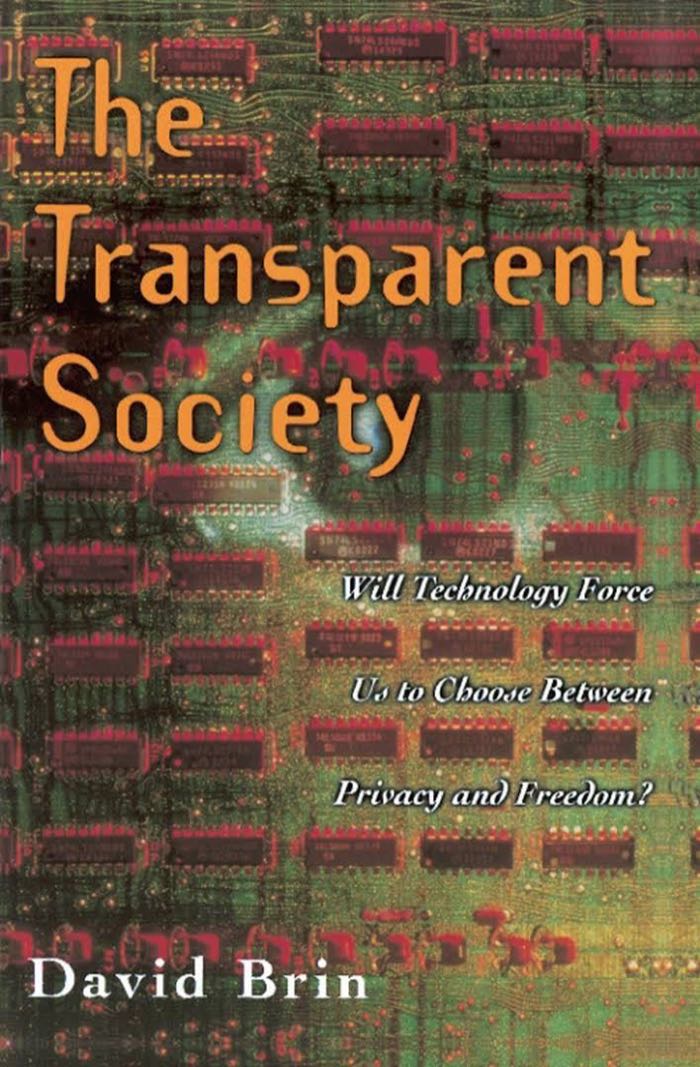The Transparent Society: Will Technology Force us to Choose Between Privacy and Freedom?
Reviewed date: 2007 Oct 3
335 pages
Should you be worried about the erosion of privacy? No, you should celebrate it, says author David Brin. His 1998 book on privacy is called The Transparent Society: Will Technology Force Us to Choose Between Privacy and Freedom? Grossly simplified, his premise is this: privacy protects the rich and powerful by shielding them from criticism. Only by peeling away layers of privacy can we achieve a level of transparency that will force the powerful to be accountable for their actions.
In all of history, we have found just one cure for error--a partial antidote against making and repeating grand, foolish mistakes, a remedy against self-deception. That antidote is criticism.
Brin casts the privacy discussion in terms of information flow. He introduces the Accountability Matrix. There are four types of privacy/transparency tools.
| 1. Tools that help me see what others are up to. | 2. Tools that prevent others from seeing what I am up to. |
| 3. Tools that help others see what I am up to. | 4. Tools that prevent me from seeing what others are up to. |
You might be tempted to say categories 1 and 2 are good but 3 and 4 are bad. After all, you don't want the government seeing what you're up to! That's the wrong reaction, according to Brin. In reality, it doesn't matter how much the government knows about you.
Historically, the ability of governments to oppress has always depended on maintaining the one-way flow of information. King, tyrants, and parties in power above all concealed information from the citizenry at large. In contrast, one would be hard pressed to show that restricting the amount of information flowing to the government has more than a marginal impact on preventing the arrival of tyranny.
The way to maintain a free society is to maximize transparency by preserving the free flow of information. Thus, a culture that values freedom should hold categories 1 and 3 as good, and categories 2 and 4 as bad.
Brin makes little distinction between government and companies when evaluating transparency. The need for transparency is no less when the Orwellian institution is a credit bureau as opposed to a government agency. Credit bureaus are Brin's case in point: for years, the bureaus refused to let people see what was in their own credit report. When the government finally forced the bureaus to be more open, people could finally view their own credit reports and identify errors. The quality and accuracy of credit reports increased because of the new transparency.
Daniel J. Solove, Associate Professor of Law at George Washington University Law School, criticizes Brin for promoting transparency as a panacea. In his 2004 book, The Digital Person: Technology and Privacy in the Information Age, he points out that transparency does nothing to help ordinary people who don't have the resources to sift through a wealth of information.
Brin fails to realize that affording mutuality of access to information will do little to empower ordinary individuals. The reason is that information is much more of an effective tool in the hands of a large bureaucracy. Information is not the key to power in the Information Age--knowledge is. Information consists of raw facts. Knowledge is information that has been sifted, sorted, and analyzed. The mere possession of information does not give one power; it is the ability to process that information and the capability to use the data that matter. In order to solve the problem, a transparent society would have to make each individual as competent as bureaucratic organizations in processing information into knowledge.
Solove's objection is valid. Bureaucracies are better able to make use of information than an average unskilled citizen. Transparency will not make ordinary people the equal of powerful corporations and governments. Citizens will still need watchdog organizations and advocacy groups to protect their privacy rights. But that does not lessen the need for transparency. As Brin says, surveillance technology is here and it will be used.
[It] is already far too late to prevent the invasion of cameras and databases. The djinn cannot be crammed back into its bottle. No matter how many laws are passed, it will prove quite impossible to legislate away the new surveillance tools and databases. They are here to stay.
Light is going to shine into nearly every corner of our lives.
...
We may not be able to eliminate the intrusive glare shining on citizens of the next century, but the glare just might be rendered harmless through the application of more light aimed in the other direction.
The benefits of transparency are already being recognized. In the United States, the Freedom of Information Act (FOIA) allows citizens to access a wealth of federal documents that shed light into the workings of the US government. Many US states have similar laws to achieve transparency into the workings of state governments.
We are still a long way from Brin's transparent society, but we are moving that way.
